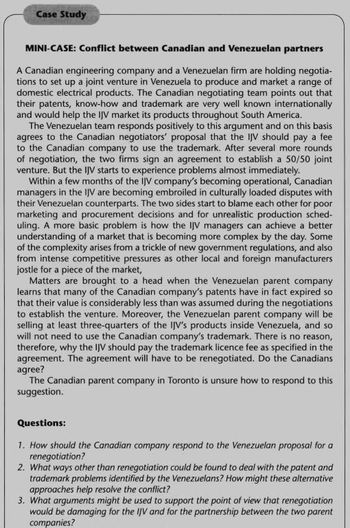
Understanding Business
12th Edition
ISBN: 9781259929434
Author: William Nickels
Publisher: McGraw-Hill Education
expand_more
expand_more
format_list_bulleted
Question

Transcribed Image Text:Case Study
MINI-CASE: Conflict between Canadian and Venezuelan partners
A Canadian engineering company and a Venezuelan firm are holding negotia-
tions to set up a joint venture in Venezuela to produce and market a range of
domestic electrical products. The Canadian negotiating team points out that
their patents, know-how and trademark are very well known internationally
and would help the IJV market its products throughout South America.
The Venezuelan team responds positively to this argument and on this basis
agrees to the Canadian negotiators' proposal that the IJV should pay a fee
to the Canadian company to use the trademark. After several more rounds
of negotiation, the two firms sign an agreement to establish a 50/50 joint
venture. But the IJV starts to experience problems almost immediately.
Within a few months of the IJV company's becoming operational, Canadian
managers in the IJV are becoming embroiled in culturally loaded disputes with
their Venezuelan counterparts. The two sides start to blame each other for poor
marketing and procurement decisions and for unrealistic production sched-
uling. A more basic problem is how the IJV managers can achieve a better
understanding of a market that is becoming more complex by the day. Some
of the complexity arises from a trickle of new government regulations, and also
from intense competitive pressures as other local and foreign manufacturers
jostle for a piece of the market,
Matters are brought to a head when the Venezuelan parent company
learns that many of the Canadian company's patents have in fact expired so
that their value is considerably less than was assumed during the negotiations
to establish the venture. Moreover, the Venezuelan parent company will be
selling at least three-quarters of the IJV's products inside Venezuela, and so
will not need to use the Canadian company's trademark. There is no reason,
therefore, why the IJV should pay the trademark licence fee as specified in the
agreement. The agreement will have to be renegotiated. Do the Canadians
agree?
The Canadian parent company in Toronto is unsure how to respond to this
suggestion.
Questions:
1. How should the Canadian company respond to the Venezuelan proposal for a
renegotiation?
2. What ways other than renegotiation could be found to deal with the patent and
trademark problems identified by the Venezuelans? How might these alternative
approaches help resolve the conflict?
3. What arguments might be used to support the point of view that renegotiation
would be damaging for the IJV and for the partnership between the two parent
companies?
Expert Solution
This question has been solved!
Explore an expertly crafted, step-by-step solution for a thorough understanding of key concepts.
This is a popular solution
Trending nowThis is a popular solution!
Step by stepSolved in 2 steps

Knowledge Booster
Similar questions
- E. Balance of Trade signments: 26. is a system of exchange in which goods and services are used as payment rather than money: A. Trade Deficit Assignments: -20 B. Trade Surplus C. Comparative Advantage Trade Assignments: 1-27 D. Countertrade 4 Assignments: E. Balance of Trade 28-Oct. 4 27 Taking ands that woro produuced within a company's home country and shipping them to another countryarrow_forwardAnswer the question and give at least two resources. What were the unique challenges faced by Coats within its industry?arrow_forwardDiscuss the General Agreement on Trade in Services (GATS) in terms of the framework agreement, the GATS Annexes and the GATS Schedules of Specific Commitments and consider whether “Progressive Liberalisation” is a realistic long-term objective for GATSarrow_forward
arrow_back_ios
arrow_forward_ios
Recommended textbooks for you
 Understanding BusinessManagementISBN:9781259929434Author:William NickelsPublisher:McGraw-Hill Education
Understanding BusinessManagementISBN:9781259929434Author:William NickelsPublisher:McGraw-Hill Education Management (14th Edition)ManagementISBN:9780134527604Author:Stephen P. Robbins, Mary A. CoulterPublisher:PEARSON
Management (14th Edition)ManagementISBN:9780134527604Author:Stephen P. Robbins, Mary A. CoulterPublisher:PEARSON Spreadsheet Modeling & Decision Analysis: A Pract...ManagementISBN:9781305947412Author:Cliff RagsdalePublisher:Cengage Learning
Spreadsheet Modeling & Decision Analysis: A Pract...ManagementISBN:9781305947412Author:Cliff RagsdalePublisher:Cengage Learning Management Information Systems: Managing The Digi...ManagementISBN:9780135191798Author:Kenneth C. Laudon, Jane P. LaudonPublisher:PEARSON
Management Information Systems: Managing The Digi...ManagementISBN:9780135191798Author:Kenneth C. Laudon, Jane P. LaudonPublisher:PEARSON Business Essentials (12th Edition) (What's New in...ManagementISBN:9780134728391Author:Ronald J. Ebert, Ricky W. GriffinPublisher:PEARSON
Business Essentials (12th Edition) (What's New in...ManagementISBN:9780134728391Author:Ronald J. Ebert, Ricky W. GriffinPublisher:PEARSON Fundamentals of Management (10th Edition)ManagementISBN:9780134237473Author:Stephen P. Robbins, Mary A. Coulter, David A. De CenzoPublisher:PEARSON
Fundamentals of Management (10th Edition)ManagementISBN:9780134237473Author:Stephen P. Robbins, Mary A. Coulter, David A. De CenzoPublisher:PEARSON

Understanding Business
Management
ISBN:9781259929434
Author:William Nickels
Publisher:McGraw-Hill Education

Management (14th Edition)
Management
ISBN:9780134527604
Author:Stephen P. Robbins, Mary A. Coulter
Publisher:PEARSON

Spreadsheet Modeling & Decision Analysis: A Pract...
Management
ISBN:9781305947412
Author:Cliff Ragsdale
Publisher:Cengage Learning

Management Information Systems: Managing The Digi...
Management
ISBN:9780135191798
Author:Kenneth C. Laudon, Jane P. Laudon
Publisher:PEARSON

Business Essentials (12th Edition) (What's New in...
Management
ISBN:9780134728391
Author:Ronald J. Ebert, Ricky W. Griffin
Publisher:PEARSON

Fundamentals of Management (10th Edition)
Management
ISBN:9780134237473
Author:Stephen P. Robbins, Mary A. Coulter, David A. De Cenzo
Publisher:PEARSON